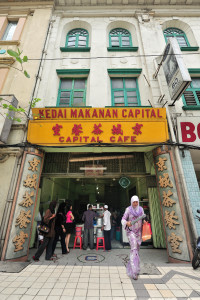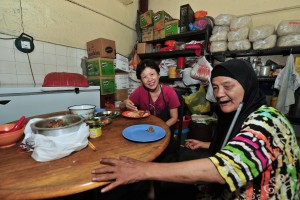As Malaysia celebrates its 50 year of existence, the Rocket’s Faye Chia took a step into nostalgia and revisits what many of us have taken for granted, the acceptance and embrace of something and someone different from ourselves. Something that used to bind many of us living the Malaysian dream together, before the division that politics wrought for us brought us apart. Report by Faye Chia (Chinese Rocket). Translated and adapted by T.K. Tan. Photos courtesy of Chris Goh.
After 57 years in business, the quiet and unassuming Capital Café isn’t just serving food for the neighbourhood and its customers, but a sense of camaraderie that has come to signify the melting pot that we call home, Malaysia.
Located at the bustling Jalan Tuanku Abdul Rahman, the café was born a year before Malaya’s independence. For many ‘otais’ (old timers) the eatery harbours many memories, not just for its coffee and signature food. It’s also a place where three beautiful cultures met and interacted and embraced each other every day.
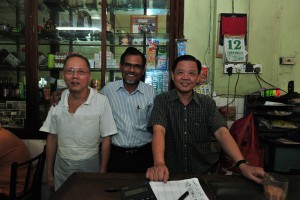 Some background on the café: The owner of the café, 90 year old Mr Lim Huat Hin braved the seas and communist persecution in China and migrated to Penang in 1950. Soon he found himself in Kuala Lumpur and scrounged just enough savings and started the café business with some friends.
Some background on the café: The owner of the café, 90 year old Mr Lim Huat Hin braved the seas and communist persecution in China and migrated to Penang in 1950. Soon he found himself in Kuala Lumpur and scrounged just enough savings and started the café business with some friends.
Starting at 7.30am to 8pm every day, Lim would work the water kettle and prepares the coffee for every customer himself. There are also three stalls that sells Nasi Padang, fried noodles and rojak. By 5.30pm a satay stall opens for business.
Like any typical mom and pop store, Lim’s life can’t be separated from the café. From forming the business, marriage and having family, everything has revolved around the café. In fact he and family still lives in the floor up stairs. Without a doubt, Capital Café and its surrounding environment is house and home in every sense of the word.
Even though he is retired from the day-to-day running of the business, Lim can still be seen at the coffee shop every day, greeting and chatting with the patrons.
When asked, Huat Hin said that when the café started renting the stalls, a word came to him, variety.
“I wanted some different taste to be present in the cafe’s eatery stalls so that my customers could sample some different cultural taste. I wasn’t very particular about who came first; that’s how it all started for us,” when describing about how the muhibbah outlook came about.
Like the café management, the nasi padang stall is also in the second generation’s stead. The rojak pasembor stall, which was started by an Indian, is now run by a newly immigrated Muslim Indian.
Huat Hin’s successor Lim Kee Hua says that he has been helping out the café business since he was teenager. “After school it was straight to the stove, learning from and helping my father with the coffee preparations. My siblings would be busily serving in the front. Everyone knew their task,” Kee Hua recalled.
Recalling the early days, he said that the area wasn’t that developed then. “Our business was average then. It was when the development in the city picked up and word of mouth spread about us that’s when it got better for us.”
“After the shopping malls starting sprouting up, our business really shot up. With the media coverage of the muhibbah presence in the shop, it brought in more patrons,” Kee Hua added.
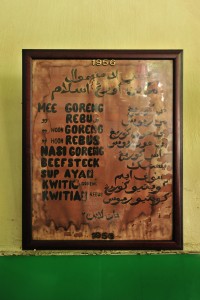 The café is a living history, having being witness to the growth of the city through the decades. Whether its taste die hard or otherwise for the regulars, the café’s nostalgic flavour continues to appeal to its clientele. Families with three generations on same tables busily helping themselves to the food is a regular sight here, a testament of its customer loyalty.
The café is a living history, having being witness to the growth of the city through the decades. Whether its taste die hard or otherwise for the regulars, the café’s nostalgic flavour continues to appeal to its clientele. Families with three generations on same tables busily helping themselves to the food is a regular sight here, a testament of its customer loyalty.
That Capital Café exhibits the muhibbah spirit that has three different eating cultures under one same roof, coexisting, accepting and even embracing each other is undeniable. It is perhaps an embodiment of something many Malaysians have missed for years.
Kee Hua often gets query from visitors about the ‘halalness’ of the eatery. “My simple answer is ‘No pork served here.’ I often get asked if I am a Muslim too (laughs)!”
“Compared to the past, we are now more understanding of each other and have less taboo handicapping us. Occasionally we still get a few kampong visitors who are queasy about the food served here. They pay up for the food, but the food is untouched,” he smiled.
The nasi padang stall owner, Ariffin, 60, who is currently running the stall with two siblings, took over the business from their father. Growing up with the Lim family, Ariffin and Kee Hua were long time play buddies. Both men were eye witnesses of the 1969 May 13 tragedy.
“My father first started operating in another coffee shop on the same row, moving here after the other shop was sold off. On that tragic May 13 day, after hearing the shouts we closed shop in a panic and ran helter-skelter back to our homes. It was after order was restored that we came back for business,’ Ariffin recalled.
“Though the stall has been operated for two generations, the flavours haven’t changed much. That doesn’t mean we haven’t keep up with the times; we’re constantly adding new dishes to the 30 plus that our father mastered” We saw an impressive array of 50 dishes for sampling.
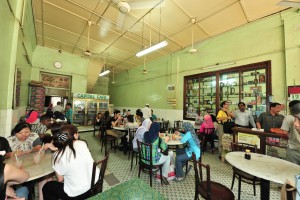 Ariffin proudly tells us about how Capital Café is known even internationally, thanks to MAS. “A foreign tourist was flipping through the back page of the airline’s recommended eatery spots and stumbled upon us. He told us we were listed there. That was a pleasant surprise for us,” he beamed.
Ariffin proudly tells us about how Capital Café is known even internationally, thanks to MAS. “A foreign tourist was flipping through the back page of the airline’s recommended eatery spots and stumbled upon us. He told us we were listed there. That was a pleasant surprise for us,” he beamed.
He recalled that when Capital café started having the three different ethnic stalls together, it became trendy. “There were five other coffee shops on the same row as we did, tagging along after our concept.”
Sadly, after 1997 when the Land Rent Control Act was repealed, it led to an explosive growth in the rental rates in the city that forced many coffee shops to move out or close down.
Capital Café’s long presence there is due to the Lims’ fortuitous decision to buy over the shop from their relatives decades ago, sheltering it from the explosive rise in rentals that has render many business turnovers in the neighbouring areas.
The noodle stall owner, Tan Tai Keong, 70, believes that tasty food brings people together, regardless of creed, colour or religion. “To be able to see the satisfied faces of my customers give meaning for me to continue this business every day.”
“I am so used to the environment here that it’s second home to me. The owners and neighbour stalls are like my family members now. I know many of my customers by names. My only regret is my Bahasa is awful!’ Tan guffawed.
Stepping into Capital Café is a walk into history and a cultural melting pot. Seeing the Lim siblings greet their patrons warmly and gently helping a blind Malay tidbits peddler into the shop reminded me that compassion and camaraderie amongst Malaysians is not a utopia.

